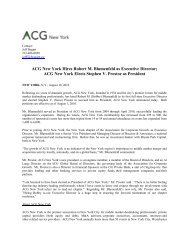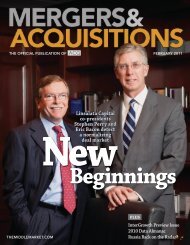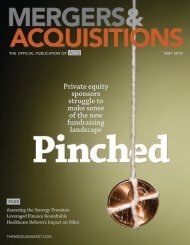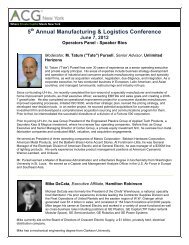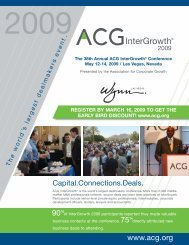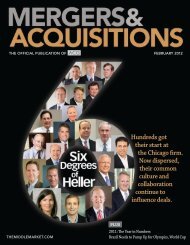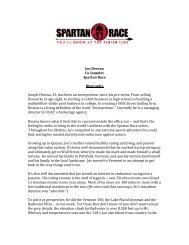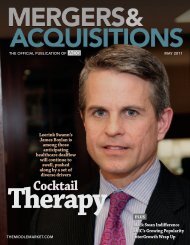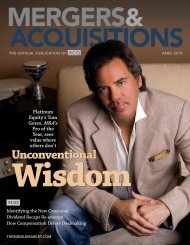Not one to mince words, KPS Capital's Michael Psaros offers a ...
Not one to mince words, KPS Capital's Michael Psaros offers a ...
Not one to mince words, KPS Capital's Michael Psaros offers a ...
- No tags were found...
You also want an ePaper? Increase the reach of your titles
YUMPU automatically turns print PDFs into web optimized ePapers that Google loves.
44-49_Feature.qxd 4/6/09 5:44 PM Page 47ProfileSpecifically, Bacon and other sponsors are onlylooking for a conversation and a sign that credi<strong>to</strong>rs arewilling <strong>to</strong> look at each situation on an individual basis.This kind of approach may stem from the firm’sbeginnings. New York Life launched Madison CapitalFunding in March of 2001, with a mandate <strong>to</strong> financemid-market LBOs sized between $15 million and $200million. The environment for leveraged loans at thistime was marked by consolidation, such as GeneralElectric’s industry-changing deal for Heller Financial,and defection, as the bigger banks were largely fleeing.This created an opening for non-bank lenders such asMadison, Dymas Capital, an affiliate of Cerberus CapitalManagement, and CapitalSource, among others.While many deal pros contendthe current crisis is as bad as they’veever seen, the upheaval caused bythe tech implosion, followed shortlyby the September 11, 2001 terroristattacks, created nearly asmuch uncertainty in the deal marketin the 2002 frame. M&A volumeplummeted by more than44% that year, with all-cash dealsrepresenting nearly 39% of the domesticactivity. It was a bad yearfor lenders and sponsors, but likethe current crisis, 2002 was essentiallya show-me year that allowedeach side <strong>to</strong> prove themselves <strong>to</strong>the other.Five of the six founding partners,all veterans of Bank of America,remain at Madison Capital.Only Terry Capsay, who retired,has since departed. This kind of continuity helps provideperspective, which has kept Madison level-headedas cycles change.Early on, Williams says, Madison was able <strong>to</strong> benefitfrom the initial dislocation in the leveraged loan arena.“When the credit crisis first hit, our pipeline reallyexploded in terms of opportunities,” Williamsdescribes, noting that in mid-2008, sellers were eager<strong>to</strong> accept lower valuations, and buyers, in turn, weren’tseeking such high leverage multiples.However, when the market <strong>to</strong>ok its knockout blowin September, sparked by the bankruptcy of LehmanBrothers, things changed quickly, as sellers, buyers andlenders all <strong>to</strong>ok a step back <strong>to</strong> reconnoiter.“There are so few deals being d<strong>one</strong> right now; anythinggetting closed in <strong>to</strong>day’s market is of extremelyLinsalata’s Bacon says relationships are<strong>to</strong>ugher <strong>to</strong> maintain in hard times.high credit quality,” Williams says.His definition of quality is characterized by companieswith stable earnings that reside in recession-resistantindustries. Sound end-markets and a diversecus<strong>to</strong>mer base are also required <strong>to</strong>day.For companies that might be border-line situations,Williams notes that relationships do count. If asponsor has a track record with Madison and has proven<strong>to</strong> be a supportive owner, it can make a difference inwhether or not a deal gets funded.Bacon <strong>to</strong>o notes that relationships go both ways. Intimes of stress, he describes, that it’s up <strong>to</strong> the sponsor<strong>to</strong> be vigilant owners and keep the lenders apprised ofwhat’s going on. “It’s our obligation <strong>to</strong> not chew throughtheir collateral,” he describes.Williams does acknowledgethat Madison will pursue fewerdeals in 2009 than last year. In2008, according <strong>to</strong> its website,Madison Capital notched 77<strong>to</strong>mbst<strong>one</strong>s, although since September,new deals have been fewand far between.At the same time, MadisonCapital has not yet followed a pathcleared by many of its peers <strong>to</strong>downsize. GE Antares, for instance,has been rumored <strong>to</strong> beplanning staff cuts, according <strong>to</strong>sister publication Investment Dealers’Digest, while familiar namessuch as American Capital Strategiesand Allied Capital have had <strong>to</strong> trimtheir respective workforces in ligh<strong>to</strong>f the market conditions.Williams credits New York Life’srelative health for providing Madison Capital with a cushion.It may seem like a small difference, but job securitycan ease the tension between the lender and sponsor.Even as deal flow remains slow, Williams anticipatesactivity will perk up in select sec<strong>to</strong>rs. “We dohave a specialized healthcare group,” he cites, notingthat activity there “has been fairly strong” compared <strong>to</strong>other areas.And when the market as a whole begins its recovery,Madison Capital should be well positi<strong>one</strong>d. Sponsors,it is well known, have very long memories whenit comes <strong>to</strong> relationships.Bacon notes, “For us it’s never about price... It’sabout understanding what’s going on and keeping yourears open. If it’s the policy of a [lender] group <strong>to</strong> notunderstand specific issues then we won’t go back.”“When the creditcrisis first hit, ourpipeline reallyexploded in termsof opportunities.”February 2009 MERGERS & ACQUISITIONS 47



